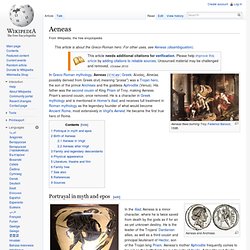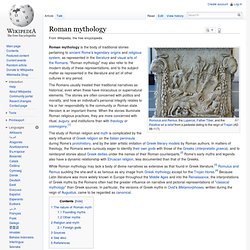

Aeneas. In Greco-Roman mythology, Aeneas (/ɪˈniːəs/; Greek: Αἰνείας, Aineías, possibly derived from Greek αἰνή meaning "praise") was a Trojan hero, the son of the prince Anchises and the goddess Aphrodite (Venus).

His father was the second cousin of King Priam of Troy, making Aeneas Priam's second cousin, once removed. He is a character in Greek mythology and is mentioned in Homer's Iliad, and receives full treatment in Roman mythology as the legendary founder of what would become Ancient Rome, most extensively in Virgil's Aeneid. He became the first true hero of Rome. Portrayal in myth and epos[edit] Aeneas and Anchises In the Iliad, Aeneas is a minor character, where he is twice saved from death by the gods as if for an as-yet unknown destiny. Birth of Aeneas[edit] The story of the birth of Aeneas is told in the "Homeric Hymn to Aphrodite.
" Aeneas in Virgil[edit] The Aeneid explains that Aeneas is one of the few Trojans who were not killed or enslaved when Troy fell. Aeneas after Virgil[edit] Romulus and Remus. Capitoline Wolf.

Traditional scholarship says the wolf-figure is Etruscan, 5th century BC, with figures of Romulus and Remus added in the 15th century AD by Antonio Pollaiuolo. Recent studies suggest that the wolf may be a medieval sculpture dating from the 13th century AD.[1] Romulus wants to found the new city on the Palatine Hill; Remus prefers the Aventine Hill.[2] They agree to determine the site through augury but when each claims the results in his own favor, they quarrel and Remus is killed.[3] Romulus founds the new city, names it Rome, after himself, and creates its first legions and senate.
The new city grows rapidly, swelled by landless refugees; as most of these are male, and unmarried, Romulus arranges the abduction of women from the neighboring Sabines. The ensuing war ends with the joining of Sabines and Romans as one Roman people. The legend as a whole encapsulates Rome's ideas of itself, its origins and moral values. The legend in ancient sources[edit] Roman mythology. Roman mythology is the body of traditional stories pertaining to ancient Rome's legendary origins and religious system, as represented in the literature and visual arts of the Romans.

"Roman mythology" may also refer to the modern study of these representations, and to the subject matter as represented in the literature and art of other cultures in any period. The Romans usually treated their traditional narratives as historical, even when these have miraculous or supernatural elements. The stories are often concerned with politics and morality, and how an individual's personal integrity relates to his or her responsibility to the community or Roman state. Heroism is an important theme.
When the stories illuminate Roman religious practices, they are more concerned with ritual, augury, and institutions than with theology or cosmogony.[1] The nature of Roman myth[edit] Founding myths[edit] Other myths[edit] Mucius Scaevola in the Presence of Lars Porsenna (early 1640s) by Matthias Stom.